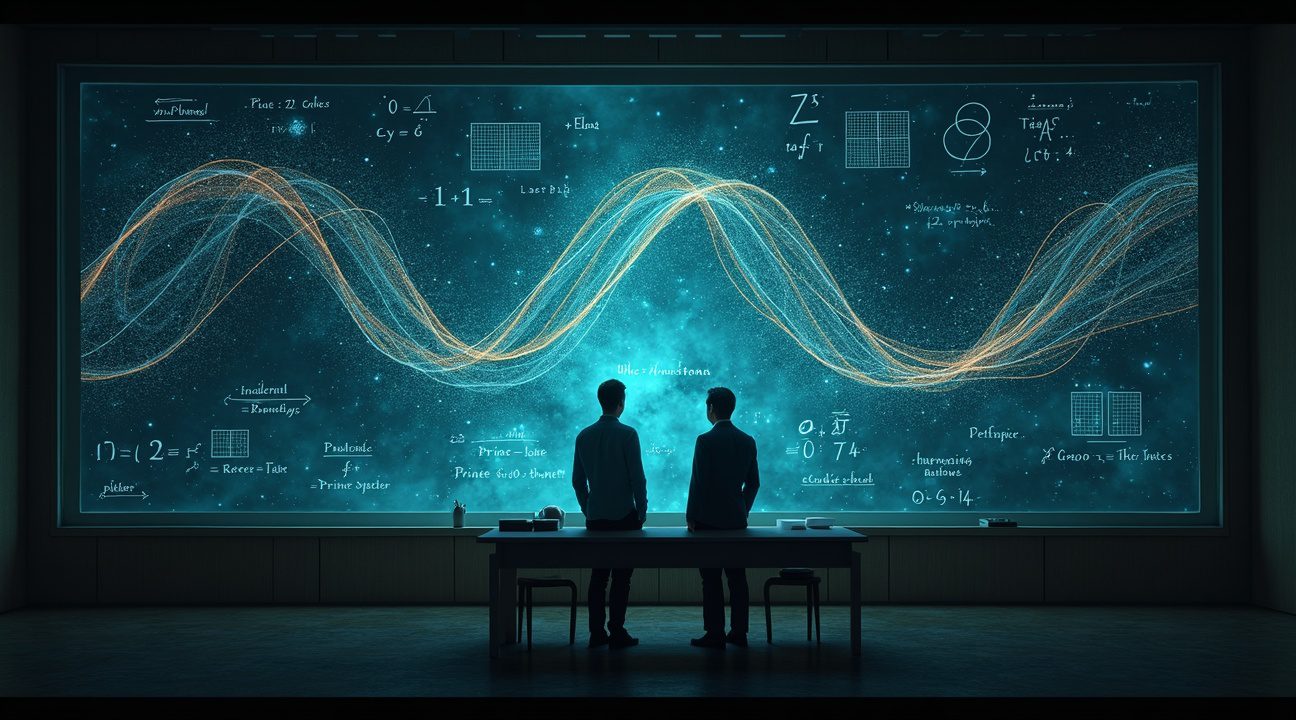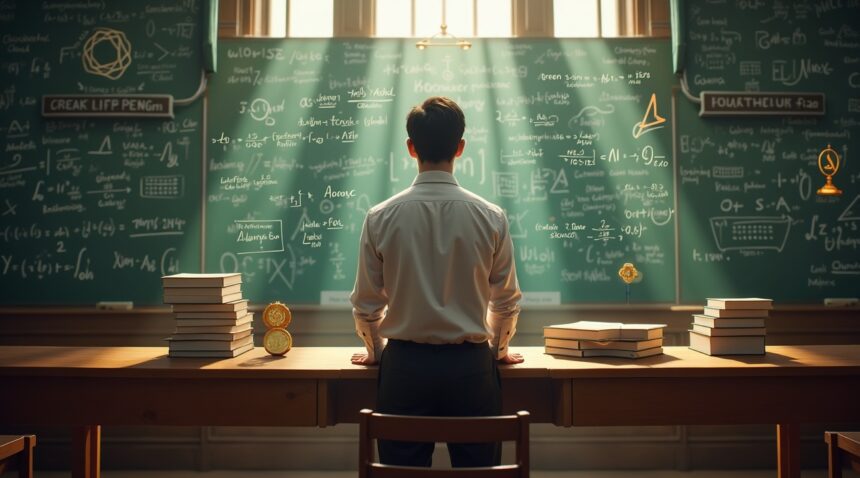Terence Tao’s extraordinary IQ of 230 places him as the second-highest recorded intelligence score globally, positioning him just behind Dr. YoungHoon Kim’s unprecedented 276 IQ according to the Giga Society and World Genius Directory. His remarkable cognitive abilities, measured through an adapted Stanford-Binet test that revealed adult-level thinking at age six, have translated into groundbreaking mathematical achievements that extend far beyond test scores alone.
Key Takeaways
- Tao holds the second-highest recorded IQ in the world at 230, placing him in extraordinarily rare cognitive territory shared by fewer than one in a billion people.
- His mathematical prodigy began early with reading at age 2, learning calculus at age 7, and becoming the youngest International Mathematical Olympiad gold medalist at age 13.
- He has received mathematics’ highest honors including the Fields Medal, MacArthur Fellowship, and the inaugural $3 million Breakthrough Prize in Mathematics.
- His groundbreaking Green-Tao theorem revolutionized number theory by proving that prime numbers contain arbitrarily long arithmetic progressions.
- Beyond pure mathematics, Tao serves on the President’s Council of Advisors on Science and Technology, demonstrating how exceptional intelligence can influence national policy and scientific advancement.
Learn More About Terence Tao
You can explore more about Terence Tao’s life and contributions to mathematics through his official UCLA faculty page, where he shares insights into his current research, publications, and mathematical journey.
The Man with a 230 IQ: Where Terence Tao Ranks Among the World’s Highest Recorded Intelligence Scores
Terence Tao stands among the most intellectually gifted individuals ever documented, with his IQ of 230 placing him in extraordinarily rare territory. According to the Giga Society and World Genius Directory, Tao currently holds the second-highest recorded IQ in the world as of 2024, a remarkable achievement that places him just behind Dr. YoungHoon Kim, who possesses an unprecedented IQ of 276.
The measurement of Tao’s exceptional intelligence came through an adaptation of the original Stanford-Binet IQ test, which revealed his cognitive abilities from an extraordinarily young age. At just six years old, Tao demonstrated intellectual capabilities equivalent to those of a typical 14-year-old, showcasing the kind of brain potential that would later revolutionize mathematics.
Elite Company: How Tao Compares to Other High-IQ Individuals
Within the exclusive circle of the world’s highest IQ holders, Tao finds himself alongside other exceptional minds. The official IQ rankings place him in remarkable company:
- Dr. YoungHoon Kim leads with an IQ of 276
- Terence Tao follows with his IQ of 230
- Marilyn vos Savant holds an IQ of 228
- Christopher Hirata demonstrates an IQ of 225
These numbers represent cognitive abilities that exist in fewer than one in a billion people. Such extraordinary intelligence levels allow individuals to process complex information, recognize patterns, and solve problems at speeds and depths that seem almost supernatural to average observers.
The Giga Society, which maintains these records, requires extensive documentation and verification before recognizing such exceptional scores. This rigorous process ensures that the world’s smartest individuals receive proper acknowledgment for their cognitive gifts. Tao’s recognition within this elite group validates not only his test performance but also his real-world contributions to mathematical understanding.
What makes Tao’s case particularly fascinating isn’t just the raw numerical score but how this intelligence manifests in practical applications. His ability to tackle problems that have stumped mathematicians for decades demonstrates that high IQ scores can translate into genuine intellectual breakthroughs. The Stanford-Binet adaptation that measured his abilities captured something profound about how his mind processes mathematical concepts and logical relationships.
These official IQ rankings provide a framework for understanding cognitive excellence, though they represent just one measure of intellectual capability. Tao’s position among the highest recorded intelligence scores reflects both his natural gifts and the rigorous testing methods used to document such exceptional abilities. The documentation by the World Genius Directory ensures that his remarkable cognitive achievements receive proper recognition within the scientific community that studies human intelligence.
From Reading at Two to Olympic Gold at Thirteen: The Making of a Mathematical Prodigy
Terence Tao’s journey into mathematical brilliance began at an extraordinarily young age. By the time most children are just beginning to speak in full sentences, Tao had already taught himself to read at age 2. This remarkable early development served as the foundation for what would become one of the most extraordinary intellectual trajectories in modern academic history.
Early Mathematical Foundations
Tao’s mathematical talents manifested themselves with stunning rapidity during his childhood years. At age 7, when most children are mastering basic arithmetic, he was already learning calculus — a subject typically reserved for high school seniors and college students. This accelerated learning path led him to take university-level courses before reaching his tenth birthday, demonstrating an intellectual capacity that defied conventional educational timelines.
The young prodigy’s exceptional abilities soon caught the attention of the international mathematical community. His participation in the International Mathematical Olympiad created a series of historic achievements that remain unmatched to this day:
- At age 10: Earned a bronze medal — the youngest medalist in history at the time
- At age 11: Won a silver medal
- At age 13: Achieved a gold medal
These milestones not only reflected his talent but also positioned him as one of the greatest young minds in mathematics.
Academic Excellence and Record-Breaking Achievements
Tao’s academic progression continued at an unprecedented pace through his university years. He earned his Doctorate in Mathematics from Princeton University by age 20, completing what typically takes students 6–8 years in roughly half that time. His doctoral work already showed signs of the groundbreaking research that would later establish him as one of the world’s leading mathematicians.
Following his Princeton graduation, Tao joined the faculty at UCLA, where he achieved another historic milestone. At just 24 years old, he became a full professor, making him one of the youngest faculty members in the university’s history. This appointment represented not only recognition of his exceptional mathematical abilities but also his capacity to contribute meaningfully to advanced research and education. His early success exemplifies how exceptional cognitive abilities can manifest in multiple dimensions, much like how proper sleep enhances brain potential in more typical circumstances.
Tao’s transformation from a child prodigy who mastered reading and calculus at impossibly young ages to becoming the youngest Olympiad medalist and eventually a tenured professor demonstrates how exceptional intelligence can accelerate traditional educational pathways. His achievements during these formative years laid the groundwork for his later recognition as potentially the smartest person alive, with mathematical physics being one of his many areas of expertise.

Mathematics’ Highest Honors: Fields Medal and the $3 Million Breakthrough Prize
I consider Terence Tao’s collection of awards to be unparalleled in contemporary mathematics. His most prestigious recognition came in 2006 when he received the Fields Medal, often called the ‘Nobel Prize of Mathematics,’ which recognizes exceptional mathematical achievement for scholars under 40. This honor alone solidifies his position among mathematics’ greatest minds.
The same year brought another extraordinary recognition—the MacArthur Fellowship, commonly known as the ‘Genius Grant.’ This fellowship acknowledges individuals who show exceptional creativity in their work and the potential for important future contributions. Tao’s receipt of both awards in 2006 demonstrated the mathematical community’s unanimous recognition of his extraordinary abilities.
Financial Recognition of Mathematical Excellence
Eight years later, Tao achieved another historic milestone by winning the inaugural $3 million Breakthrough Prize in Mathematics in 2014. This prize, often called the “Oscars of Science,” represents one of the most lucrative awards in academia. The substantial monetary component reflects the founders’ belief that scientific achievement deserves recognition comparable to entertainment and sports.
His awards extend far beyond these headline-grabbing honors:
- Nemmers Prize in Mathematics (2010) – acknowledged his significant contributions to pure and applied mathematics.
- King Faisal International Prize – recognized his influential impact on the international mathematics community.
- SASTRA Ramanujan Prize – honored his exceptional research in areas historically influenced by Srinivasa Ramanujan.
Additional honors include:
- Royal Medal
- Fellowship in the Royal Society
- Membership in the National Academy of Sciences
- Membership in the American Academy of Arts and Sciences
These memberships represent peer recognition from the highest levels of scientific achievement. What sets Tao’s recognition apart isn’t just the individual prestige of each award, but their collective scope. Few mathematicians achieve recognition across such diverse areas—from pure mathematical research to applied problem-solving, from national academies to international prizes. This breadth reflects his exceptional ability to make meaningful contributions across multiple mathematical disciplines.
His award trajectory demonstrates sustained excellence rather than a single breakthrough moment. Each recognition builds upon previous achievements while opening new research directions. This pattern suggests that his current work may lead to even more groundbreaking discoveries, potentially unlocking new cognitive approaches to mathematical problems previously considered unsolvable.
The Green-Tao Theorem and Other Mathematical Breakthroughs That Changed Number Theory
Terence Tao’s most celebrated achievement came in 2004 when he collaborated with Ben Green to prove what would become known as the Green–Tao theorem. This groundbreaking work demonstrated that prime numbers contain arbitrarily long arithmetic progressions, fundamentally changing how mathematicians understand the distribution patterns within these building blocks of mathematics. The theorem proved that no matter how long an arithmetic sequence you want, you can always find one composed entirely of prime numbers.
The significance of the Green–Tao theorem extends far beyond academic circles. Before this proof, mathematicians suspected such patterns existed but couldn’t demonstrate their presence rigorously. Tao and Green’s work provided the mathematical framework that opened new avenues for research in additive number theory and established connections between seemingly unrelated areas of mathematics.
Revolutionary Contributions Across Mathematical Disciplines
Tao’s mathematical genius extends well beyond his work with prime numbers. His contributions to the Navier–Stokes equation represent another milestone in his career, offering fresh insights and novel approaches to one of the most challenging Millennium Prize Problems. These partial differential equations describe fluid motion, yet their complete mathematical understanding has eluded researchers for decades. Tao’s work provides new perspectives that could eventually lead to a complete solution.
His research portfolio spans an impressive range of mathematical disciplines:
- Harmonic analysis, where he developed new techniques for understanding oscillatory behavior in mathematical functions
- Combinatorics, contributing to our understanding of how discrete structures can be organized and counted
- Ergodic theory, exploring long-term behavior in dynamical systems
- Partial differential equations, providing solutions and insights for complex mathematical models
- Representation theory, examining how abstract algebraic structures can be represented through matrices
- Theoretical computer science, bridging mathematics with computational complexity and algorithm design
Each of these contributions demonstrates Tao’s ability to identify connections between disparate mathematical concepts. His work often reveals hidden patterns and structures that other researchers had overlooked. For instance, his advances in harmonic analysis have influenced physics research, particularly in areas dealing with wave behavior and quantum mechanics.
Tao’s approach to mathematics reflects his extraordinary cognitive abilities. He doesn’t simply solve existing problems; he reframes entire fields by identifying fundamental questions that others haven’t considered. His work in additive number theory, for example, has created new subcategories of research that mathematicians continue to explore today.
The breadth of Tao’s contributions highlights why he’s recognized as having one of the highest measured IQs in history. His ability to work across multiple mathematical disciplines simultaneously requires not just exceptional intelligence but also remarkable pattern recognition skills. This cognitive flexibility allows him to transfer insights from one area of mathematics to another, often leading to unexpected breakthroughs.
His research methodology combines rigorous mathematical proof with intuitive understanding. Tao often describes mathematical concepts in ways that make complex ideas accessible to other researchers, fostering collaboration and advancing the field collectively. This communicative ability, combined with his analytical prowess, has accelerated progress in numerous mathematical areas.
The impact of Tao’s work continues to ripple through the mathematical community. Graduate students build upon his theorems, researchers extend his methodologies, and new applications emerge regularly. His contributions to brain research through mathematical modeling demonstrate how pure mathematics can influence other scientific disciplines.
Tao’s mathematical breakthroughs represent more than individual achievements; they’ve reshaped how mathematicians approach fundamental questions about numbers, patterns, and mathematical structures. His work continues to inspire new generations of mathematicians who seek to understand the deep connections underlying mathematical truth.

Beyond the Ivory Tower: Science Policy and Making Mathematics Accessible
Terence Tao’s extraordinary intellect extends far beyond solving complex mathematical theorems. He transforms abstract mathematical concepts into digestible content through his extensive collection of mathematics books and research papers. His ability to communicate intricate ideas stems from his deep understanding of how different mathematical disciplines interconnect, making him uniquely qualified to bridge gaps between specialized fields.
Expanding Mathematical Horizons Through Collaboration
Tao’s collaborative approach has redefined how mathematicians work together across traditional boundaries. His partnerships span multiple areas including harmonic analysis, partial differential equations, and number theory. These collaborations produce groundbreaking results while simultaneously demonstrating effective science communication strategies. He mentors countless students and junior researchers, sharing not just mathematical knowledge but also techniques for presenting complex ideas clearly. His mentoring philosophy emphasizes:
- Breaking down intimidating problems into manageable components
- Encouraging cross-disciplinary exploration and learning
- Developing clear writing and presentation skills
- Building confidence in tackling challenging mathematical concepts
- Fostering collaborative relationships within the mathematical community
The impact of his outreach efforts reaches well beyond academic circles. Through his blog and public lectures, Tao makes advanced mathematical thinking accessible to students, educators, and curious minds worldwide. His writing style avoids unnecessary jargon while maintaining mathematical rigor, creating content that serves both educational and inspirational purposes.
In 2021, recognition of Tao’s broader impact culminated in his appointment to the President’s Council of Advisors on Science and Technology. This prestigious position acknowledges his ability to translate mathematical insights into practical policy recommendations. His role involves advising on national science priorities, research funding strategies, and educational initiatives that strengthen America’s scientific competitiveness.
This appointment reflects a growing understanding that mathematical expertise plays a crucial role in addressing national challenges. From cybersecurity to climate modeling, advanced mathematics provides the foundation for solving complex problems that affect millions of people. Tao’s position on the council ensures that mathematical perspectives inform critical policy decisions at the highest levels of government.
His influence on science policy extends beyond formal advisory roles. Through various public forums and academic conferences, he advocates for increased mathematics education funding and research support. Physics and mathematics collaboration often drives breakthrough discoveries, and Tao frequently emphasizes these connections in policy discussions.
The combination of his exceptional analytical abilities and communication skills positions Tao as a powerful advocate for mathematical sciences. His work demonstrates that even the most abstract mathematical concepts can have real-world applications when properly communicated and applied. This dual focus on pure research and practical application exemplifies how brilliant minds can serve both academic advancement and societal progress.

Why IQ Alone Doesn’t Tell the Full Story of Who’s ‘Smartest’
Intelligence measurements present fascinating contradictions when examining who truly deserves the title of “smartest person” alive. Dr. YoungHoon Kim currently holds the world record for the highest documented IQ at 276, surpassing even Terence Tao’s remarkable 230 score. Yet this numerical ranking doesn’t capture the complete picture of intellectual greatness.
The Limitations of IQ as a Sole Measure
IQ tests measure specific cognitive abilities within controlled environments, but they can’t quantify creativity, practical problem-solving, or real-world impact. While organizations like the Giga Society recognize individuals with extraordinary test scores, these assessments often fail to predict who will make the most significant contributions to human knowledge. Brain potential extends far beyond what standardized tests can measure.
Consider how Tao’s mathematical achievements eclipse many individuals with higher IQ scores. His work on prime number theory, partial differential equations, and harmonic analysis has fundamentally changed mathematical understanding. These contributions demonstrate applied intelligence that transforms entire fields of study.
Real-World Impact vs. Test Performance
Intelligence rankings based purely on numerical scores miss crucial elements of intellectual greatness. Tao’s prodigious early development, combined with sustained productivity and innovative thinking, showcases intelligence in action rather than theoretical potential. His ability to connect disparate mathematical concepts and solve previously unsolvable problems illustrates practical genius.
The smartest person designation becomes more meaningful when considering actual accomplishments rather than test results alone. While physics and mathematics require exceptional cognitive ability, they also demand persistence, creativity, and the capacity to communicate complex ideas effectively.
- IQ measures potential, not results or applications.
- Creative and applied intelligence often yield the greatest societal contributions.
- Emotional intelligence, motivation, and communication also play major roles in real-world success.
IQ comparison studies reveal interesting patterns about different types of intelligence. Some individuals excel at pattern recognition and logical reasoning measured by tests, while others demonstrate superior abilities in creative problem-solving and innovative thinking. Tao represents the rare combination of exceptional test performance and extraordinary real-world application.
The debate over who qualifies as the “smartest person” ultimately highlights how intelligence manifests in multiple dimensions. Raw cognitive ability provides the foundation, but transformative impact on human knowledge requires additional qualities that standard assessments can’t capture. Tao’s enduring influence on mathematics demonstrates why intellectual greatness transcends simple numerical rankings, even when those numbers reach extraordinary heights like his 230 IQ score.
Sources:
“TOP 10 PEOPLE WITH WORLD’S HIGHEST IQ EVER RECORDED,” Giga Society
“Terence Tao: Awards,” Carnegie Corporation of New York
“Top 10 highest IQ individuals in the world,” Times of India
“Terence Tao Awards,” MacTutor, University of St Andrews
“Terence Tao,” Wikipedia
“Mathematics Breakthrough Prize Laureates – Terence Tao,” Breakthrough Prize
“Huh, I remember when this happened…,” Hacker News/Y Combinator
“Terence Tao | Research Starters,” EBSCO
“CEE Presents Dr. Terence Tao with the Joseph I. Lieberman Award”
“Professor Terence Tao FRS – Fellow Detail Page,” Royal Society
“UCLA’s Terence Tao awarded inaugural $3 million Breakthrough…” UCLA Newsroom


